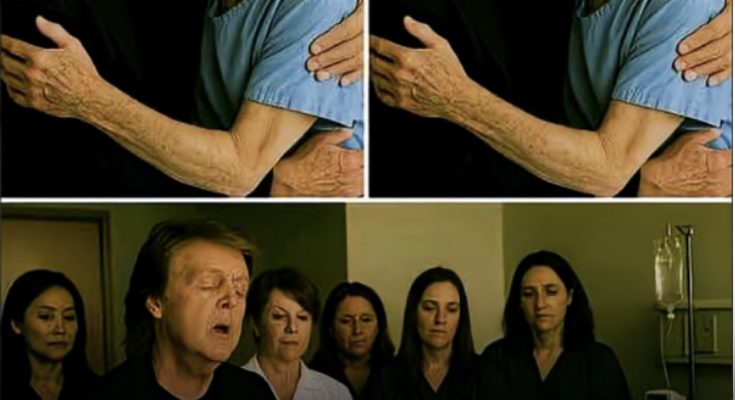LONDON — In a quiet, sun-dappled room of a London hospital, far from the roar of adoring crowds and the glare of stage lights, one of rock and roll’s most enduring bonds was quietly reaffirmed. Sir Paul McCartney, carrying not a bouquet of flowers but his trusted old acoustic guitar, arrived for a visit that would become a profound testament to friendship, memory, and the healing power of music.
His audience was one of his oldest friends and peers, Phil Collins. The Genesis icon and legendary drummer has faced a long and public battle with severe health issues that have left him unable to play the instrument that made him famous. But on this day, he was not a patient; he was a bandmate once more.
Without fanfare, McCartney pulled up a chair. He wasn’t there for a brief visit or a photo opportunity. He was there to do what they have both done their entire lives: make music. Strumming the first, familiar chords of The Beatles’ timeless anthem, “Hey Jude,” McCartney’s voice filled the room—not with the polished power of a global superstar, but with the soft, raw, and tender emotion of a friend offering comfort.
The performance was stripped bare of production, a private serenade where every note was infused with decades of shared history, mutual respect, and unspoken understanding. As the final, reassuring words—”na-na-na nananana…”—faded into the room’s silence, McCartney set the guitar aside.
He leaned in close to his friend and whispered a line that would cut straight to the heart of the moment: “We’re still a band, even if the only stage is life.”
The profound truth of that statement hung in the air. It was a reminder that the connection forged in music transcends instruments, charts, and physical ability. The band—the brotherhood of musicians who have shared the unique journey of shaping the world’s soundtrack—never truly disbands. It simply finds new stages.
For those privileged to witness it, the moment was overwhelming. The room fell into a sacred silence, punctuated only by the sound of tears, not of sadness, but of overwhelming reverence for a bond that fame could not create and that time and illness cannot erase.
This was not a moment captured for social media or a publicity stunt. It was a private act of love, a musical prayer offered from one legend to another. It served as a powerful reminder that before the knighthoods, the Grammys, and the platinum records, they were just boys who loved to play. And in that quiet London room, that’s exactly what they did. It was a performance that asked for nothing and gave everything, proving that the greatest music isn’t always played in stadiums—sometimes, it’s played in the silence of a hospital room, for an audience of one.



